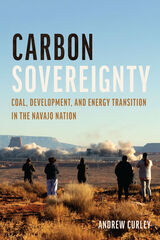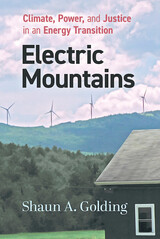3 books about Energy Transition

Carbon Sovereignty
Coal, Development, and Energy Transition in the Navajo Nation
Andrew Curley
University of Arizona Press, 2023
For almost fifty years, coal dominated the Navajo economy. But in 2019 one of the Navajo Nation’s largest coal plants closed.
This comprehensive new work offers a deep dive into the complex inner workings of energy shift in the Navajo Nation. Geographer Andrew Curley, a member of the Navajo Nation, examines the history of coal development within the Navajo Nation, including why some Diné supported coal and the consequences of doing so. He explains the Navajo Nation’s strategic choices to use the coal industry to support its sovereignty as a path forward in the face of ongoing colonialism. Carbon Sovereignty demonstrates the mechanism of capitalism through colonialism and the construction of resource sovereignty, in both the Navajo Nation’s embrace and its rejection of a coal economy.
For the people of the Navajo Nation, energy sovereignty is dire and personal. Thanks to on-the-ground interviews with Diné coal workers, environmental activists, and politicians, Curley documents the real consequences of change as they happened. While some Navajo actors have doubled down for coal, others have moved toward transition. Curley argues that political struggles ultimately shape how we should understand coal, capitalism, and climate change. The rise and fall of coal magnify the nuance and complexity of change. Historical and contemporary issues intermingle in everyday life with lasting consequences.
This comprehensive new work offers a deep dive into the complex inner workings of energy shift in the Navajo Nation. Geographer Andrew Curley, a member of the Navajo Nation, examines the history of coal development within the Navajo Nation, including why some Diné supported coal and the consequences of doing so. He explains the Navajo Nation’s strategic choices to use the coal industry to support its sovereignty as a path forward in the face of ongoing colonialism. Carbon Sovereignty demonstrates the mechanism of capitalism through colonialism and the construction of resource sovereignty, in both the Navajo Nation’s embrace and its rejection of a coal economy.
For the people of the Navajo Nation, energy sovereignty is dire and personal. Thanks to on-the-ground interviews with Diné coal workers, environmental activists, and politicians, Curley documents the real consequences of change as they happened. While some Navajo actors have doubled down for coal, others have moved toward transition. Curley argues that political struggles ultimately shape how we should understand coal, capitalism, and climate change. The rise and fall of coal magnify the nuance and complexity of change. Historical and contemporary issues intermingle in everyday life with lasting consequences.
[more]

Electric Mountains
Climate, Power, and Justice in an Energy Transition
Shaun A. Golding
Rutgers University Press, 2021
Climate change has shifted from future menace to current event. As eco-conscious electricity consumers, we want to do our part in weening from fossil fuels, but what are we actually a part of?
Committed environmentalists in one of North America’s most progressive regions desperately wanted energy policies that address the climate crisis. For many of them, wind turbines on Northern New England’s iconic ridgelines symbolize the energy transition that they have long hoped to see. For others, however, ridgeline wind takes on a very different meaning. When weighing its costs and benefits locally and globally, some wind opponents now see the graceful structures as symbols of corrupted energy politics.
This book derives from several years of research to make sense of how wind turbines have so starkly split a community of environmentalists, as well as several communities. In doing so, it casts a critical light on the roadmap for energy transition that Northern New England’s ridgeline wind projects demarcate. It outlines how ridgeline wind conforms to antiquated social structures propping up corporate energy interests, to the detriment of the swift de-carbonizing and equitable transformation that climate predictions warrant. It suggests, therefore, that the energy transition of which most of us are a part, is probably not the transition we would have designed ourselves, if we had been asked.
Committed environmentalists in one of North America’s most progressive regions desperately wanted energy policies that address the climate crisis. For many of them, wind turbines on Northern New England’s iconic ridgelines symbolize the energy transition that they have long hoped to see. For others, however, ridgeline wind takes on a very different meaning. When weighing its costs and benefits locally and globally, some wind opponents now see the graceful structures as symbols of corrupted energy politics.
This book derives from several years of research to make sense of how wind turbines have so starkly split a community of environmentalists, as well as several communities. In doing so, it casts a critical light on the roadmap for energy transition that Northern New England’s ridgeline wind projects demarcate. It outlines how ridgeline wind conforms to antiquated social structures propping up corporate energy interests, to the detriment of the swift de-carbonizing and equitable transformation that climate predictions warrant. It suggests, therefore, that the energy transition of which most of us are a part, is probably not the transition we would have designed ourselves, if we had been asked.
[more]

Revolutionary Power
An Activist's Guide to the Energy Transition
Shalanda H. Baker
Island Press, 2020
In September 2017, Hurricane Maria hit Puerto Rico, completely upending the energy grid of the small island. The nearly year-long power outage that followed vividly shows how the new climate reality intersects with race and access to energy. The island is home to brown and black US citizens who lack the political power of those living in the continental US. As the world continues to warm and storms like Maria become more commonplace, it is critical that we rethink our current energy system to enable reliable, locally produced, and locally controlled energy without replicating the current structures of power and control.
In Revolutionary Power, Shalanda Baker arms those made most vulnerable by our current energy system with the tools they need to remake the system in the service of their humanity. She argues that people of color, poor people, and indigenous people must engage in the creation of the new energy system in order to upend the unequal power dynamics of the current system.
Revolutionary Power is a playbook for the energy transformation complete with a step-by-step analysis of the key energy policy areas that are ripe for intervention. Baker tells the stories of those who have been left behind in our current system and those who are working to be architects of a more just system. She draws from her experience as an energy-justice advocate, a lawyer, and a queer woman of color to inspire activists working to build our new energy system.
Climate change will force us to rethink the way we generate and distribute energy and regulate the system. But how much are we willing to change the system? This unique moment in history provides an unprecedented opening for a deeper transformation of the energy system, and thus, an opportunity to transform society. Revolutionary Power shows us how.
In Revolutionary Power, Shalanda Baker arms those made most vulnerable by our current energy system with the tools they need to remake the system in the service of their humanity. She argues that people of color, poor people, and indigenous people must engage in the creation of the new energy system in order to upend the unequal power dynamics of the current system.
Revolutionary Power is a playbook for the energy transformation complete with a step-by-step analysis of the key energy policy areas that are ripe for intervention. Baker tells the stories of those who have been left behind in our current system and those who are working to be architects of a more just system. She draws from her experience as an energy-justice advocate, a lawyer, and a queer woman of color to inspire activists working to build our new energy system.
Climate change will force us to rethink the way we generate and distribute energy and regulate the system. But how much are we willing to change the system? This unique moment in history provides an unprecedented opening for a deeper transformation of the energy system, and thus, an opportunity to transform society. Revolutionary Power shows us how.
[more]
READERS
Browse our collection.
PUBLISHERS
See BiblioVault's publisher services.
STUDENT SERVICES
Files for college accessibility offices.
UChicago Accessibility Resources
home | accessibility | search | about | contact us
BiblioVault ® 2001 - 2024
The University of Chicago Press









